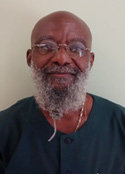- January 17th, 2016
- /
- NCD Stories
- /
- 0 Comments
- /
- Chair of Grenada’s National Chronic Non-communicable
Disease Commission speaks out
Professor Ọmọwale Amulẹru-Marshall, Chair of Grenada’s NCD Commission explores successes and highlights challenges facing the body as it tries to make a difference in the NCD response.
 My name is Ọmọwale Amulẹru-Marshall and I am a Professor of Public Health and Preventive Medicine and Director of Community Health and Outreach at St. George’s University in Grenada. I have also been Chair of the National Chronic Non-communicable Disease Commission since June 2010 when it was set up. Grenada has been aware of the need for an entity to coordinate responses to the challenge to NCDs for some time. At least as early as 2002, we had a National Advisory Committee on Chronic Disease Prevention and Control which predated the 2007 Port of Spain Declaration on NCDs by a good few years. Although this committee met irregularly and wasn’t hugely influential, Grenada was still in the vanguard of the regional NCD response. I’d like that to be recognised.
My name is Ọmọwale Amulẹru-Marshall and I am a Professor of Public Health and Preventive Medicine and Director of Community Health and Outreach at St. George’s University in Grenada. I have also been Chair of the National Chronic Non-communicable Disease Commission since June 2010 when it was set up. Grenada has been aware of the need for an entity to coordinate responses to the challenge to NCDs for some time. At least as early as 2002, we had a National Advisory Committee on Chronic Disease Prevention and Control which predated the 2007 Port of Spain Declaration on NCDs by a good few years. Although this committee met irregularly and wasn’t hugely influential, Grenada was still in the vanguard of the regional NCD response. I’d like that to be recognised.
“We’ve tried to ensure that the Commission involves as many sectors as possible”
A degree of success
At the Commission we’ve had a degree of success in terms of public education; raising awareness through radio shows, outreach and public consultations. We’ve also tried to ensure that the Commission involves as many sectors as possible, including trades unions, tertiary institutions, civil society organisations such as faith-based groups, health-focussed NGOs and other constituencies like the Grenada Chamber of Commerce and Industry and the Grenada Olympic Association. I think we are a relatively active Commission.
Recently we hosted a visit from the regional civil society organisation, the Healthy Caribbean Coalition, accompanied by the Health Advisor from The Commonwealth Secretariat. In addition to meeting the Commission, members of the delegation met the Minister of Health whom they regarded as very enthusiastic and prepared to accept suggestions as to how to move the national response forward.
We have built very strong relationships with committed and hardworking senior professional staff at the Ministry of Health, several of whom sit on the Commission. They are making a huge contribution.
Serious challenges
Despite such progress, we still have a number of serious challenges. We meet regularly, once a month, but of our 23 members often only eight to ten actually turn up. Clearly, this is an issue for me.
“NCDs have to be central to the agenda given that the level of chronic diseases in Grenada is overwhelming, accounting for virtually 70% of national morbidity and mortality.”
And to be honest, I’m not really sure how deep our impact has been. Over the years we’ve had varying levels of engagement with Ministers of Health; some have been very hands-on, others less so. It has also been somewhat difficult to get the NCD response on the Cabinet agenda. We have to find new ways and new approaches to remedy this; gaining greater access to the levers of decision-making in a spirit of cooperation and collaboration. I’d like to have a more formalised and systematic relationship with the Cabinet. Tadalafil is the main active substance of Cialis. As we have already said, this is a better remedy than Sildenafil. In instances where Viagra is powerless, Cialis copes with the task perfectly. It is effective for the treatment of psychological, somatic and psychosomatic causes of erectile dysfunction. In this, it is useful even in the most severe cases. Besides, Viagra can’t be combined with alcohol, while food decreases its efficiency. If you decided to buy Tadalafil, feel free to drink some alcohol and eat.
It is understood that the government has a number of competing priorities but NCDs have to be central to the agenda given that the level of chronic diseases in Grenada is overwhelming, accounting for virtually 70% of national morbidity and mortality.
A new focal point
I would like to see the re-instatement of the position of Chronic Disease Focal Point in the Ministry of Health. Currently, these diseases come under the remit of the Chief Medical Officer who has a lot of other ground to cover as well. Someone able to concentrate exclusively on NCDs would be very welcome.
As a Commission we have no budget and no staff. It would make a huge difference to have two or three dedicated staff members to help drive our work forward. The measure of success we have had is due in large part to the administrative and logistical support we receive from St. George’s University.
There are a number of concerns, but also plenty of opportunities to come together to respond more effectively to the biggest public health challenge facing our region today.



